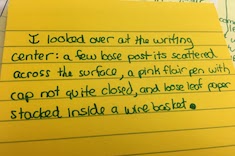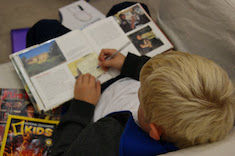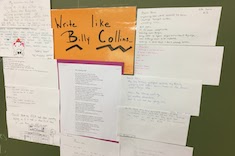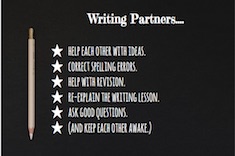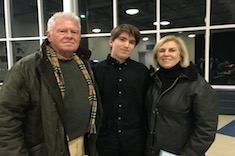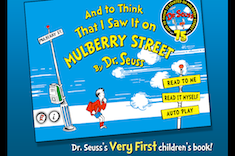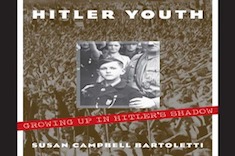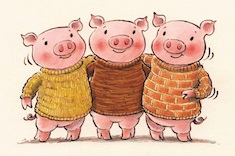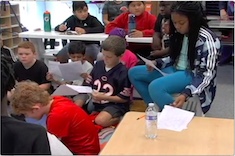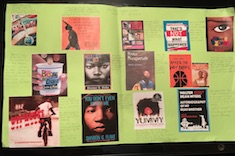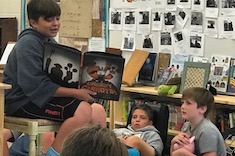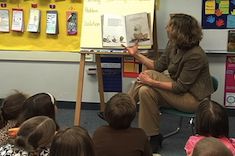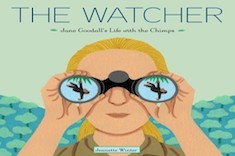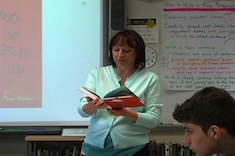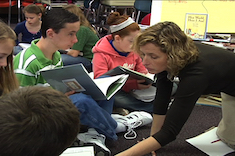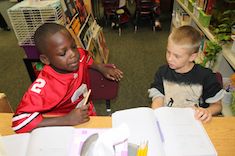6th
Latest Content
Student Ownership of Literary Analysis
Christy Rush-Levine shares the strategies she uses to help her middle school students take ownership of their literary analysis essays.
Studying Craft and Punctuation in Sentences from Read Alouds
Tara Barnett and Kate Mills share the power of teaching writer’s craft in bite-sized chunks, through careful study of mentor sentences in read alouds.
Keeping Parent Communication Open in Middle School
Tara Barnett and Kate Mills find that they have to change the way they think about connecting with families once students reach middle school.
Making Learning Stick: Learning Progressions and Student-Created Exemplars
Tammy Mulligan explains the process of having students analyze and create models of good writing and analysis for assessing themselves and peers.
Creating a Safe Space in Middle School
Christy Rush-Levine ponders what it means to create a safe space for all of her middle school students, and then makes some changes.
Poetry and Pastiche
Tara Barnett and Kate Mills introduce their middle school students to pastiche, a technique of mimicking the craft of favorite poems and poets.
Writing Partners
Partner work is an essential component of many literacy workshops. Dana Murphy explains how she is intentional in building thoughtful routines and expectations for partner work in her fifth-grade classroom.
Exploring Author’s Craft in Graphic Novels
Christy Rush-Levine finds her middle school students need more support and scaffolds to understand authors’ craft in graphic novels.
Self-Esteem and Literacy: Understanding Jeff
Jeff is apathetic and unengaged. To help this middle school learner, Mark Levine needs to understand his history. Mark shows the power of interviews for connecting with struggling teen learners.
Community Timeline Project
Katherine Sokolowski uses the Community Timeline Project to bring together students and older community members around history and writing. Includes a downloadable interview guide to help students record the interviewee’s life story.
Scaffolding Instruction in an Author Study
Christy Rush-Levine scaffolds her middle-school students’ understanding of craft moves by moving from short stories to novels when studying specific authors.
Magic Connections: Young Adult Literature in a Social Studies Class
Mark Levine shows how young adult literature is a potent tool to drive learning in his middle school social studies classroom.
When Learning Gets Tricky, Go Back to the Pigs
Whenever a tricky literary concept comes up, Tammy Mulligan finds herself returning to a favorite mentor text to guide students. She explains the value of shared simple stories for understanding complicated literary elements.
The Freewrite Pause
Mark Levine finds his middle school students need more time to digest learning from brief articles. Freewriting provides the perfect pause for promoting more reflection and insight.
Whole-Class Reflection in Middle School
Mark Levine explains why whole-class reflection is an essential component of his middle school workshops.
Building Reading Identities Across the Year
The start of the school year is often all about building reader identities in classrooms. And then October comes, and many of the activities that help students celebrate their reading histories and preferences are forgotten. Tara Barnett and Kate Mills share ways teachers can continue to help students define, refine, and expand their reading identities all year long.
Circle Share
Sometimes “winging it” because we don’t have plans can lead to the most profound learning. Dana Murphy dreams up a quick circle share, and what follows is magic.
Textual Lineage
Christy Rush-Levine uses book covers to help her middle-school students explore their histories (or “lineages”) as readers.
Book Club Tools
Tammy Mulligan shares the importance of giving students choice and agency with book club tools to improve engagement and the quality of the conversations.
Moving from Interactive Read Alouds to Book Clubs
Tammy Mulligan shares how teachers can move seamlessly from thoughtful conversations during whole-class read alouds to lively book clubs.
Introducing Social Studies Concepts with Picture Books
Mark Levine explains how picture books are powerful teaching tools in his middle school classroom.
Read Aloud in Middle School
Katherine Sokolowski values read aloud for her middle school students and struggles to find time for them. Her solution? A picture book a day, better known as the #bookaday activity.
Grand Conversations and Read Aloud
Are your conversations during read aloud stilted or shallow? Tammy Mulligan recommends weekly “grand conversations” to spark more thoughtful talk. She provides the tools you need to get started in your classroom.
Jane Goodall Inquiry: Introducing Expectations
Katherine Sokolowski introduces her students to routines and expectations early in the year with a unit on Jane Goodall, including many short read alouds.
Back-Channel Conversations During Read Alouds
Christy Rush-Levine considers some of the “underground” ways in which she converses about books at conferences and on social media, and decides to set up a back channel for similar conversations about read alouds in her classroom.
Interactive Read Aloud and the Whole-Class Notebook
Tammy Mulligan enhances the quality of the class read aloud and student discussions with the use of a whole-class response notebook.
A Better Status of the Class
Dana Murphy finds that adding numbers of pages to her status-of-the-class list for reading makes all the difference in assessing students’ growth and needs as readers.
Talking Through Characters
Melanie Meehan shares activities that help students talk about their characters before writing about them in a realistic fiction unit.
Summer Literacy
“What can I do to help my son and daughter stay sharp and not lose momentum during the summer?” When a parent asks this question, Mark Levine offers his Top Six Summer Slide Preventers.
Releasing the Teaching to Students
Mark Levine releases responsibility for teaching and assessment to students late in the school year, and hears echoes of learning from previous units.
Browse Content By
Type
Category
- Assessment Tools
- Big Fresh Archives
- Booklists
- Choice Numeracy
- Classroom Design
- Common Core
- Community Building
- Conferring
- Content Literacy
- Digital Literacy
- English Language Learners
- Equity
- Family Relations
- Free Samples
- Guiding Groups
- Leadership
- Literacy Coaches
- Mentor Texts
- Minilessons
- New Teacher Mentors
- Podcasts
- Poetry
- Quote Collections
- Reading Strategies
- Self Care
- Struggling and Striving Learners
- Talking and Listening
- Teacher Study Groups
- Teaching Reading
- Teaching Writing
- Word Study and Vocabulary
Author
- Melissa Quimby
- Nawal Qarooni
- Gwen Blumberg
- Julie Cox
- The Lead Learners
- Hannah Tills
- Josie Stewart
- Ruth Metcalfe
- Mallory Messenger
- Becca Burk
- Jodie Bailey
- Vivian Chen
- Mary Brower
- Tiffany Abbott Fuller
- Stephanie Affinito
- Ruth Ayres
- Leigh Anne Eck
- Heather Fisher
- Shari Frost
- Julie Johnson
- Suzy Kaback
- Gigi McAllister
- Shirl McPhillips
- Melanie Meehan
- Cathy Mere
- Debbie Miller
- Tara Barnett and Kate Mills
- Tammy Mulligan
- Dana Murphy
- Bitsy Parks
- David Pittman
- Brenda Power
- Heather Rader
- Matt Renwick
- Mandy Robek
- Christy Rush-Levine
- Gretchen Schroeder
- Jen Schwanke
- Brian Sepe
- Katherine Sokolowski
- Stella Villalba
- Jennifer Vincent
Grade Level
Choice Literacy Membership
Articles
Get full access to all Choice Literacy article content
Videos
Get full access to all Choice Literacy video content
Courses
Access Choice Literacy course curriculum and training


